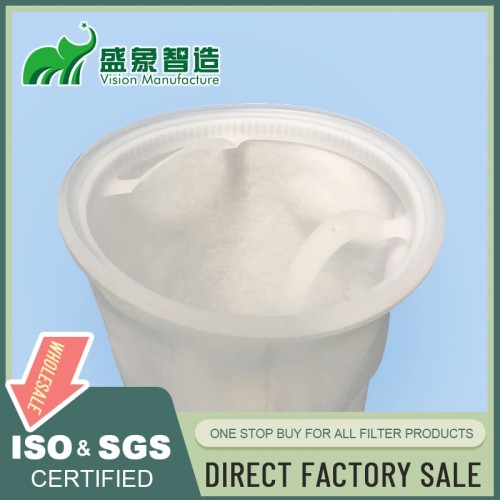
75 Micron Filter Bags Deliver Precision in Industrial Filtration
I. Introduction
In the realm of industrial filtration, precision is paramount. The 75 micron filter bags play a critical role in ensuring high-quality filtration across various industries. This introduction discusses the importance of 75 micron filtration, providing an overview of the technology and its impact on enhancing product quality and operational efficiency.
II. Understanding 75 Micron Filtration
- Micron Rating Explained: A 75 micron filter bag is designed to capture particles that are 75 micrometers in diameter, offering a balance between fine and coarse filtration.
- Particle Size Perspective: Discusses the types of particles typically targeted by this filtration grade, which include finer particulates that could compromise product quality or process stability.
- Filtration Efficiency at 75 Microns: Evaluates how effectively these bags can purify liquids and gases, ensuring that only the smallest of unwanted particles are captured.
III. Types of 75 Micron Filter Bags
- Material Options: Includes polyester, polypropylene, and nylon, each offering unique benefits such as moisture resistance, chemical compatibility, and strength.
- Construction Methods: Features sewn, welded, and other assembly techniques that enhance the durability and performance of the bags.
- Size and Shape Variations: Available in various dimensions to accommodate different systems and applications.
IV. Applications Across Industries
75 micron filter bags are utilized in a variety of sectors due to their precise filtration capabilities:
- Chemical Processing: For filtering out fine impurities that can affect chemical reactions and product purity.
- Water and Wastewater Treatment: Essential in both drinking and wastewater treatment processes for removing fine particulates.
- Food and Beverage Production: Used to ensure the clarity and purity of consumables.
- Pharmaceutical Manufacturing: Critical in maintaining contaminant-free conditions in drug production.
- Paint and Coatings Industry: Ensures that coatings are free of impurities that could affect finish quality.
- Automotive Fluids Filtration: Filters out fine particulates in automotive fluids to ensure engine and system cleanliness.
V. Key Features and Benefits
- Precise Filtration Capabilities: Ensures high accuracy in particle removal, crucial for maintaining quality standards.
- Balanced Flow Rates: Allows for efficient processing of fluids without significant pressure drops.
- Excellent Dirt-Holding Capacity: Can accumulate substantial amounts of particulate matter before requiring cleaning or replacement.
- Versatility in Applications: Suitable for a wide range of industries due to their robust design.
- Cost-effectiveness: Offers a good balance between performance and expense, making them a viable option for many businesses.
VI. Material Selection Criteria
- Chemical Compatibility: Ensuring the material is suitable for the chemical composition of the fluid.
- Temperature Resistance: Choosing materials that can withstand the operational temperature range.
- Abrasion Resistance: Ensuring the bags can handle the physical demands of the application.
- Durability and Lifespan: Selecting materials that offer long service life under typical operating conditions.
VII. Design Considerations
- Bag Dimensions and Capacity: Tailored to meet the requirements of various filtration systems.
- Seam Types and Strength: Affects the overall strength and integrity of the bags.
- Surface Treatments: Often includes treatments like singeing or coating to improve performance.
- Attachment Methods: Ensures secure and effective integration into existing systems.
VIII. Performance Characteristics
- Flow Rate Capabilities: The volume of fluid that can be processed efficiently.
- Pressure Drop Profiles: Minimizing resistance to maintain energy efficiency.
- Particle Retention Efficiency: Effectiveness in trapping desired particle sizes.
- Service Life Expectations: Duration the bags can be expected to perform before needing replacement.
IX. Installation and Maintenance
- Proper Installation Techniques: Ensures the integrity of the bags during setup.
- Break-in Procedures: Important for stabilizing the filter's performance after installation.
- Cleaning and Regeneration Methods: Techniques to maintain filter efficiency.
- Replacement Guidelines: Knowing when to replace bags to maintain system efficiency.
X. Comparative Analysis
- 75 Micron vs. Finer Filtration Grades: Evaluating the need for subsequent finer filtration stages based on the application.
- Advantages Over Coarser Filters: Assessing the benefits of more precise particle removal compared to larger micron ratings.
- Cost-Benefit Analysis in Various Applications: Evaluating the economic impacts of using 75 micron bags versus other filtration methods.
XI. Environmental Considerations
- Recyclability of Filter Materials: Encourages the use of sustainable practices.
- Energy Efficiency in Filtration Processes: Reduces the overall energy consumption of the system.
- Waste Reduction Through Reusability: Minimizes environmental footprint.
- Eco-friendly Disposal Methods: Encourages responsible end-of-life handling.
XII. Case Studies
Illustrative examples from various industries demonstrate the benefits of implementing advanced dust collector systems, highlighting improvements in air quality, efficiency in material handling, and compliance with environmental standards.
XIII. Future Developments
Emerging technologies and trends in the field of filtration include:
- Advanced Materials for 75 Micron Filtration: Enhancements that improve durability and filtration efficiency.
- Smart Filtration Systems Integration: Incorporation of sensors and monitoring systems for better management.
- Customization for Specific Industry Needs: Tailoring solutions to meet specific industrial needs.
- Improvements in Manufacturing Techniques: Enhancing the production process to increase filter effectiveness and reduce costs.
XIV. Conclusion
75 micron filter bags are essential for optimizing industrial filtration processes, offering a balance of efficiency and cost-effectiveness. As industries continue to demand higher standards in filtration, these bags provide a reliable and effective solution. For organizations looking to enhance their filtration systems, embracing these advanced solutions is a strategic move towards achieving superior operational outcomes.
Leave a comment

